Looking for a Personalized Diet Plan?
Soya Chunks Calories, Nutrition, and Health Benefits

By Asfia Fatima, Chief Dietitian at Clearcals
Soya chunks are a powerhouse of plant-based protein, making them an excellent dietary choice for vegetarians and fitness enthusiasts.
They are derived from defatted soy flour and are packed with high-quality protein. Their rich nutrient composition makes them an excellent meat substitute.
In this blog, we will explore soya chunks' calories, nutrition, and health benefits while also explaining how the Hint app can help you optimize your diet.
Soya Chunks Calories
100 grams of raw soya chunks contain 344 calories. 60% of the calories are protein, 38% are carbs, and about 2% are fat. Here is a breakdown of soya chunks calories with quantity in grams.
| Quantity (grams) | Soya Chunks Calories (kcal) |
|---|---|
| 25 | 86 |
| 30 | 103 |
| 50 | 172 |
| 100 | 344 |
| 150 | 517 |
| 200 | 689 |
| 250 | 861 |
| 300 | 1034 |
Soya Chunks Protein
A 100-gram serving of soya chunks contains approximately 52 grams of protein, making them one of the richest plant-based protein sources. Here is a breakdown of soya chunks protein with quantity in grams.
| Quantity (grams) | Soya Chunks Protein (grams) |
|---|---|
| 25 | 13 |
| 30 | 15.6 |
| 50 | 26 |
| 100 | 52 |
| 150 | 78 |
| 200 | 104 |
| 250 | 130 |
| 300 | 156 |
Soya Chunks Nutrition
100g of soya chunks provide about 344 calories with the following macronutrient breakdown:
- Protein: 52g
- Carbohydrates: 33g
- Fats: 0.5g
- Fiber: 13g
Tracking these nutrients is easy with the Hint app, which helps users log their daily intake and effectively meet their fitness goals.
Health Benefits of Soya Chunks
1. Are Soya Chunks Good for Health?
Yes, soya chunks are highly beneficial due to their high protein and fiber content. They support muscle growth, heart health, and digestion.
2. Soya Chunks Benefits for Females
Soya chunks are rich in isoflavones, which mimic estrogen and help balance hormonal fluctuations, particularly during menopause.
3. Are Soya Chunks Good for Weight Loss?
Soya chunks have a high protein and fiber content, which promotes satiety and reduces overall calorie intake, making them excellent for weight loss.
4. Are Soya Chunks Good for Weight Gain?
When consumed in higher quantities, soya chunks can help with weight gain by providing a calorie-dense protein source.
5. Are Soya Chunks Good for Diabetes?
Yes, soya chunks have a low glycemic index and high fiber, making them suitable for diabetic individuals.
Soya Chunks and Thyroid Health
Are Soya Chunks Good for Thyroid Patients? While soya chunks are nutritious, excessive soy consumption may interfere with thyroid function, particularly for those with iodine deficiency.
If you have thyroid issues, consult a Hint Premium dietitian for personalized guidance.
Soya Chunks and Male Health
Why Soy is Bad for Males?
There is a common myth that soy consumption can lower testosterone in men. However, moderate intake does not cause hormonal imbalances.
Is Soy Protein Bad for Men?
No, soya protein powder and soya chunks provide high-quality protein without harmful effects when consumed in moderation.
Soya Chunks Preparation and Cooking Tips
How to Eat Soya Chunks for Protein?
Soya chunks can be included in various dishes like soya pulao, soya chunks curry, and soya chunks rice to boost protein intake.
Other Soy-Based Products and Their Benefits
1. Soy Milk
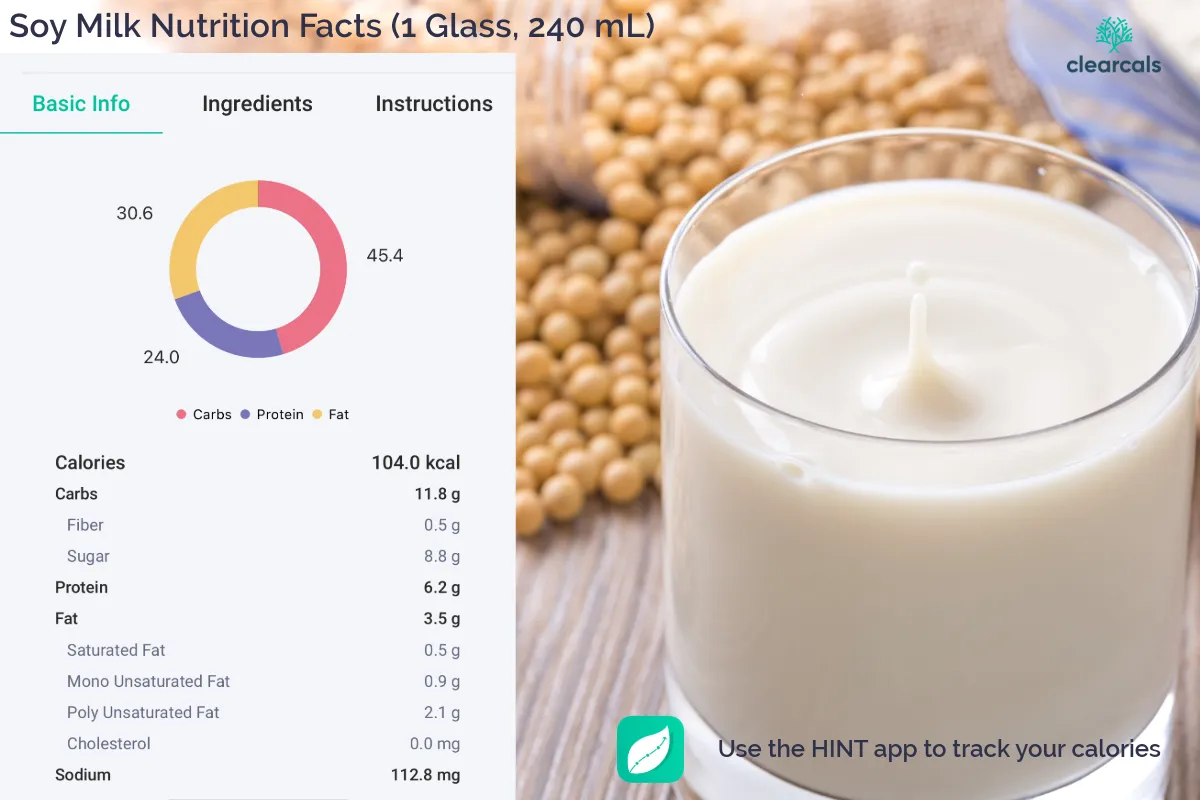
Soy milk is a plant-based milk alternative made from soybeans. It is naturally rich in high-quality protein and contains essential amino acids, making it a great option for muscle growth and overall health.
One glass (240 mL) of soy milk contains 104 calories. 45% of the calories come from carbs, 24% come from protein, and 31% come from fats in the soy milk.
Soy milk is also a good source of calcium (when fortified), vitamin D, and B vitamins, supporting bone health and energy metabolism. It is naturally lactose-free, making it suitable for those with lactose intolerance.
Additionally, soy milk contains isoflavones, which have potential heart health benefits and may help in hormone balance.
2. Soya Chaap
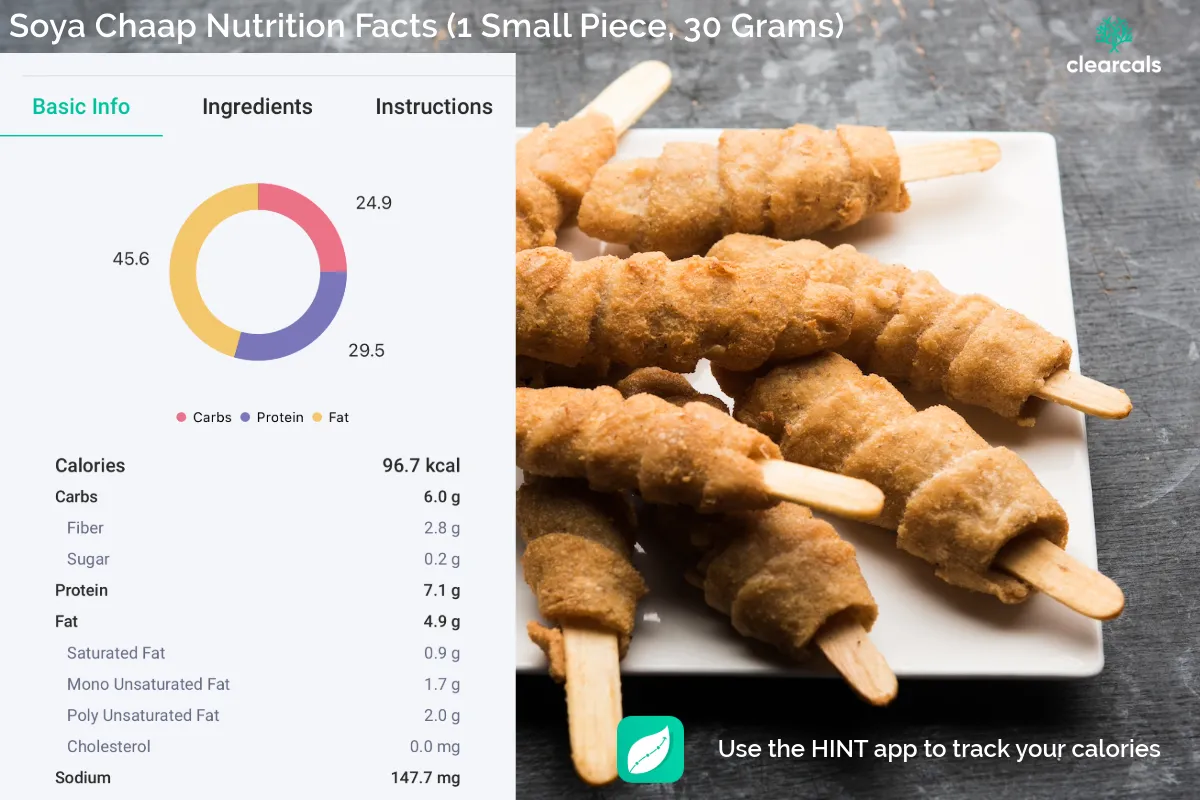
Soya chaap is a popular North Indian dish made from textured soy protein, shaped into skewers, and marinated with spices before grilling or cooking in a rich gravy.
Soya Chaap Calories
1 small piece (30 grams) of soya chaap contains 97 calories. 25% of the calories come from carbs, 29% come from protein, and 46% come from fats in the soya chaap.
Soya Chaap Benefits
It is high in protein and fiber, making it a great meat substitute. Its high protein content supports muscle building, while its fiber aids digestion.
Soya Chaap vs Soya Chunks
Soya chaap and soya chunks are both excellent plant-based protein sources, but they differ in composition, texture, and nutritional value.
Soya chaap is made from soy protein mixed with refined flour, giving it a meaty, chewy texture that works well in skewers, tandoori dishes, and rich gravies.
In contrast, soya chunks are made from defatted soy flour, making them highly protein-dense with a spongy texture that absorbs flavors well in curries, stir-fries, and pulao.
Nutritionally, soya chunks have a higher protein content (around 52-54% when dry) and minimal fat, making them an excellent choice for muscle building and weight management.
They are also rich in fiber, iron, and calcium. Soya chaap, while still protein-rich, often contains added flour and oil, making it slightly higher in calories and fat. However, its texture and taste make it a popular meat substitute.
For those prioritizing maximum protein intake with minimal processing, soya chunks are a better choice.
If taste and versatility in cooking are more important, soya chaap offers a great alternative with a satisfying texture.
Ultimately, both can be part of a balanced diet, depending on individual health goals and preferences.
3. Tofu (Soy Paneer)
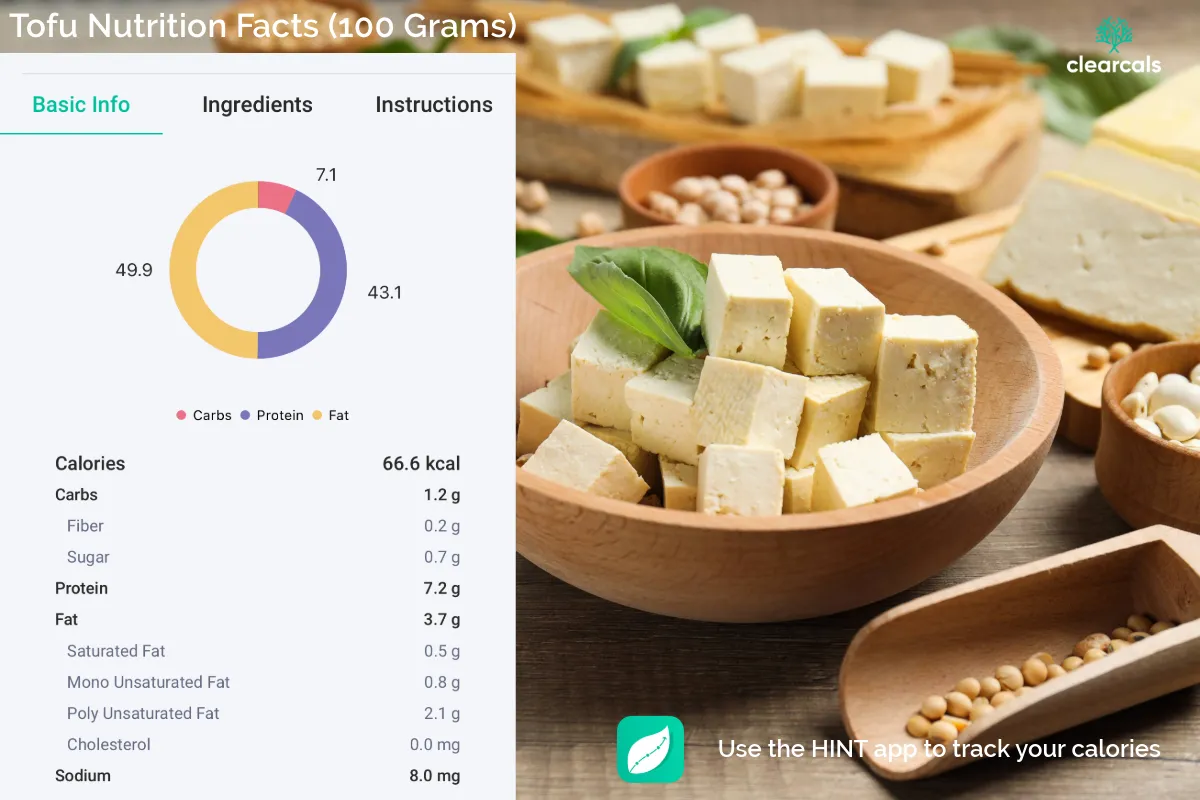
Tofu is a versatile soy product made from coagulated soy milk, often used in stir-fries, curries, and salads.
100 grams of tofu contains 67 calories. 7% of the calories come from carbs, 43% come from protein, and 50% come from fats in the soya chaap.
It is an excellent source of plant-based protein, calcium, and iron, supporting muscle growth and bone health.
Tofu is also rich in isoflavones, which may benefit heart health and hormone balance.
Also known as tofu, soya paneer is another high-protein alternative to dairy-based paneer.
4. Boiled Soya Chunks
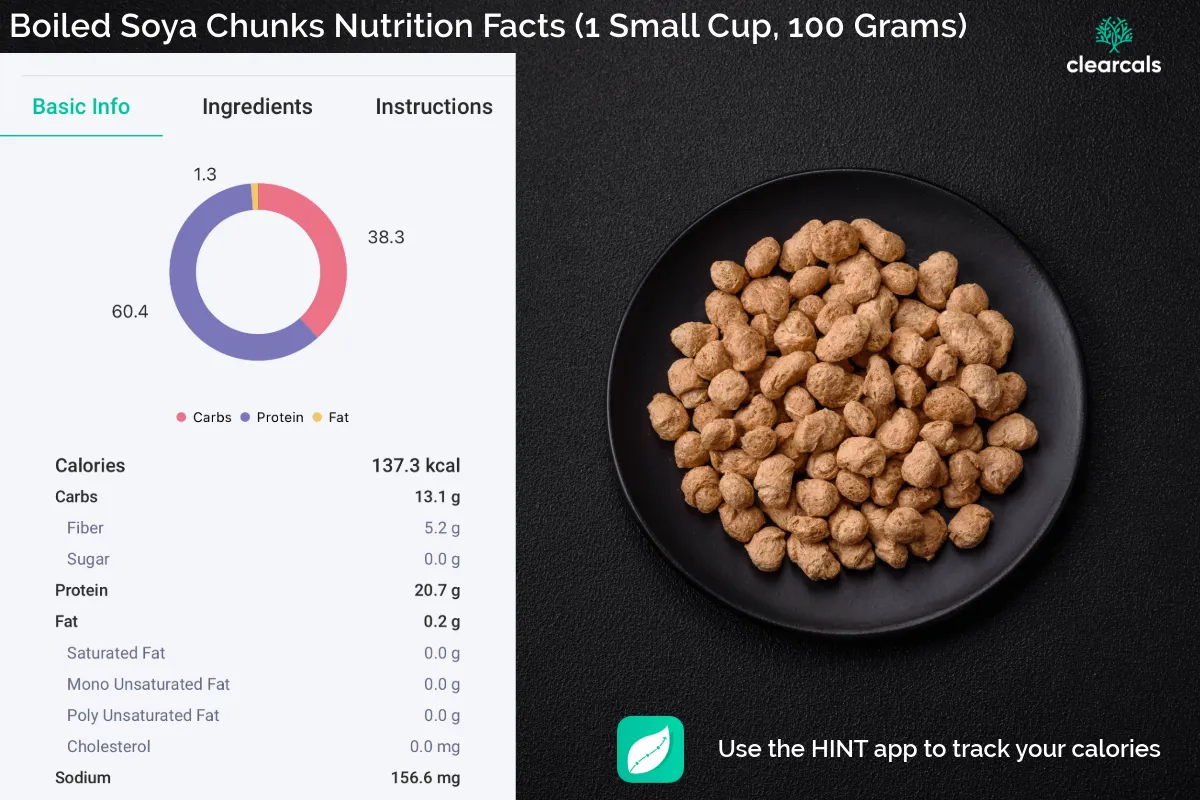
Boiled soya chunks are hydrated soy protein pieces that can be added to various dishes.
1 Small cup (100 grams) of boiled soya chunks contains 137 calories. 38% of the calories come from carbs, 60% come from protein, and 1% come from fats in the boiled soya chunks.
They are packed with protein and fiber, aiding in muscle repair and digestion. Low in fat and high in iron, they are an excellent addition to a balanced diet.
Does Boiling Soya Chunks Reduce Protein?
No, boiling rehydrates them but does not significantly reduce their protein content.
5. Soya Chunks Curry
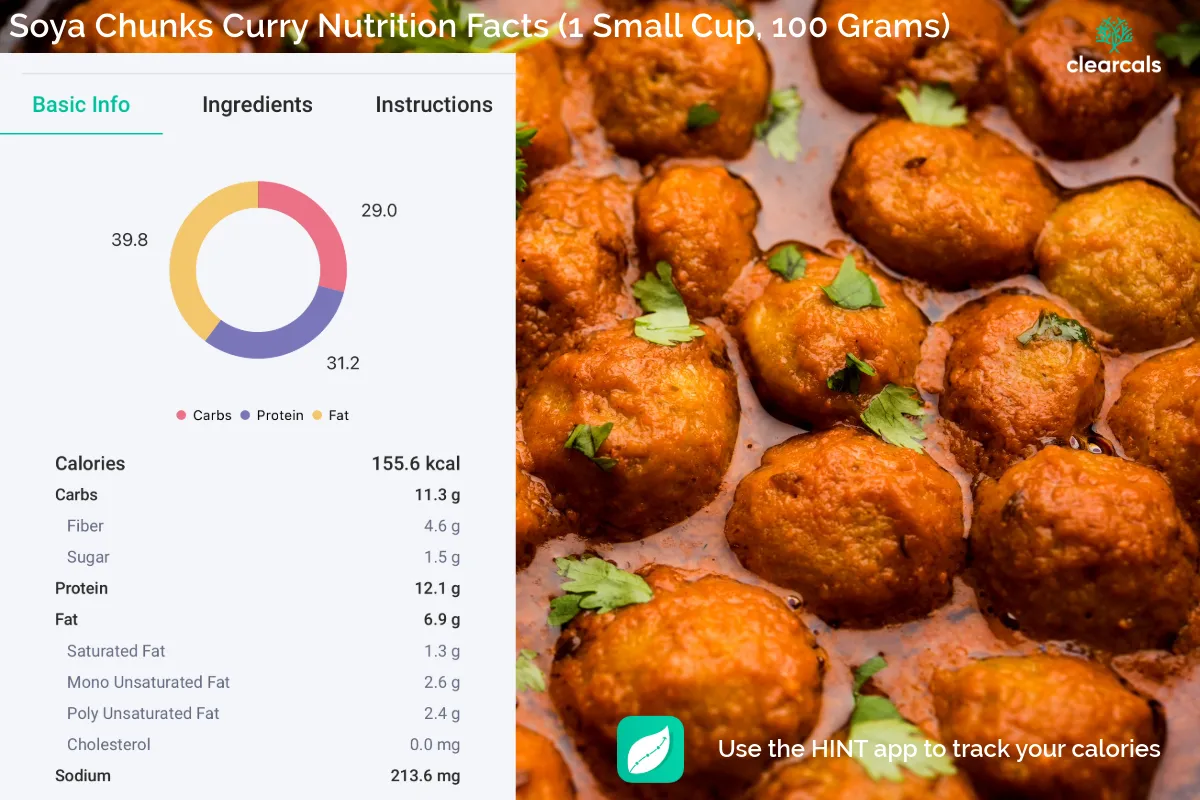
Soya chunks curry is a flavorful dish made by cooking soya chunks in a spiced tomato and onion gravy.
1 Small cup (100 grams) of soya chunks curry contains 157 calories. 29% of the calories come from carbs, 31% come from protein, and 40% come from fats in the soya chunks curry.
It is protein-rich and provides essential nutrients like iron and calcium, supporting muscle health and overall well-being. The fiber content also promotes better digestion.
6. Soya Pulao
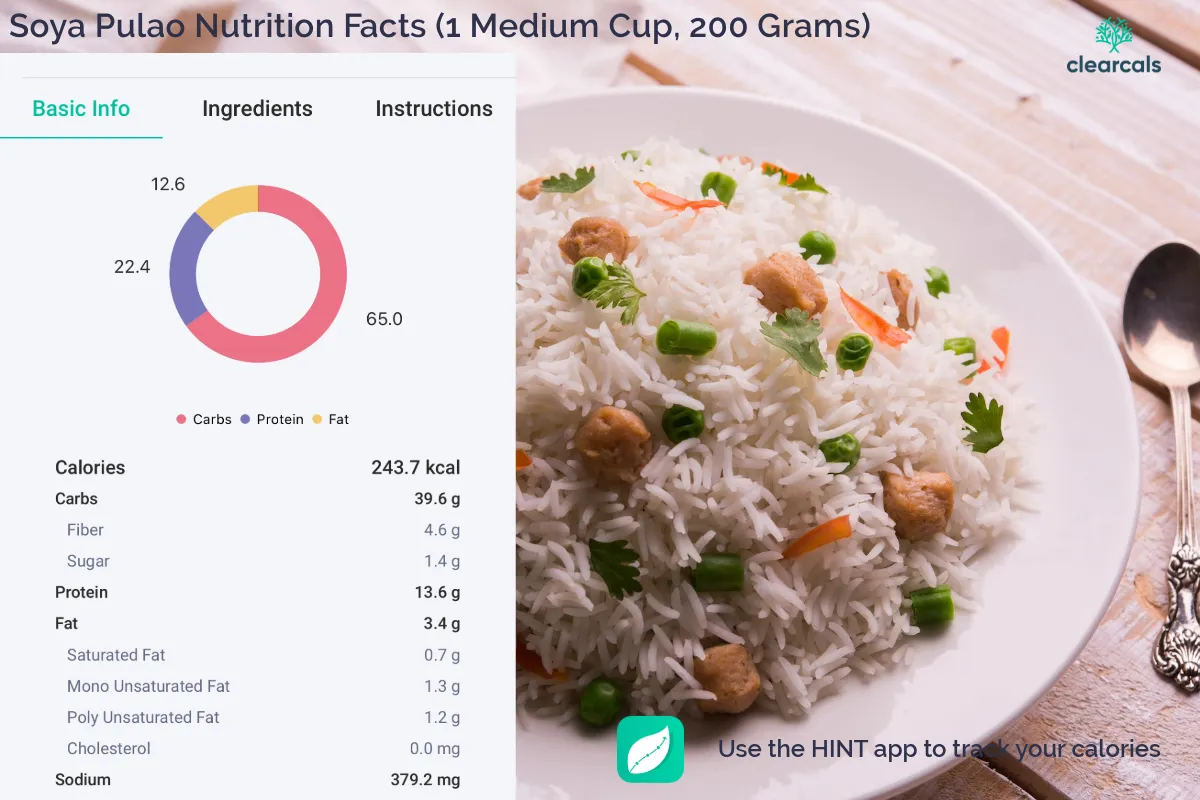
Soya pulao is a nutritious one-pot dish made with rice, soya chunks, and aromatic spices. It offers a balanced combination of protein, carbohydrates, and fiber.
1 Medium cup (200 grams) of soya pulao contains 244 calories. 65% of the calories come from carbs in the rice, 22% come from protein in the soya chunks, and 13% come from fats in the oil used to prepare the soya pulao.
The soya chunks add muscle-supporting protein, while the rice provides sustained energy, making it a wholesome meal.
7. Soya Chunks Fry
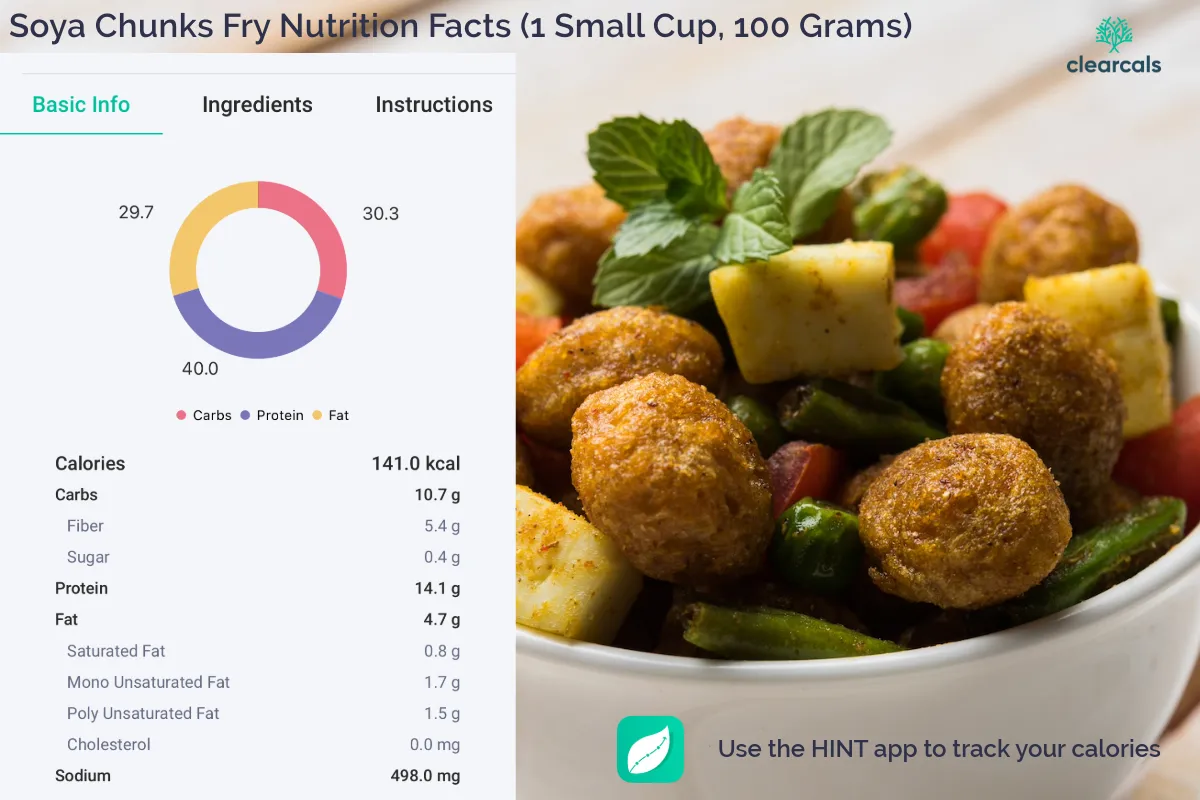
Soya chunks fry is a crispy and flavorful dish made by stir-frying or shallow-frying marinated soya chunks with spices. It is a protein-rich snack or side dish that supports muscle recovery.
1 Small cup (100 grams) of soya chunks fry contains 141 calories. 30% of the calories come from carbs, 40% come from protein, and 30% come from fats in the soya chunks fry.
Since it is high in fiber and low in cholesterol, it can be a heart-healthy addition to your diet.
Optimize Your Nutrition with the Hint App
The Hint app helps track macronutrient intake, set diet goals, and access personalized diet plans.
With a Hint Pro subscription, you can get personalized diet plans and advanced tracking features. Whereas, with Hint Premium you can get unlimited access to consult expert dietitians to optimize their meal plans based on their health goals.
Unlock your health potential with the Hint app and take control of your nutrition today!
FAQs
1. How Much Protein in 100 gm Soya Chunks?
About 52g of protein.
2. Soya Chunks vs Chicken Protein
While chicken provides lean animal protein, soya chunks offer a plant-based alternative with comparable protein levels.
3. Is Eating Soya Chunks Daily Bad?
Moderation is key; excessive consumption may affect hormone levels.
4. Soya Chunks Carbs Content?
Approximately 33g of carbohydrates per 100g.
5. Are Soya Chunks Complete Protein?
Yes, they contain all essential amino acids.
6. Calories in Soya Chaap?
Around 300 calories per 100g.
7. Soya Chunks Nutrition Facts?
High in protein, fiber, and micronutrients.
8. Fat in Soya Chunks?
Less than 1g per 100g.
9. Is Soy Milk Good for Weight Loss?
Yes, it is low in calories and high in protein.
10. Soya Rice Calories?
Around 350 calories per serving.
11. Soya Saag Benefits?
Rich in iron and protein.
Exclusive Offer: Enjoy One Month of Free Hint Premium Access
When you purchase any of the following from the Clearcals Store: Garmin Venu Sq 2, Garmin Vivoactive 5, Garmin Instinct 2, Instinct 2X Solar, or Instinct 2X Solar Tactical, you'll receive one month of free Hint Premium (worth Rs. 1999), which includes:
✅ Unlimited dietitian consultations
✅ Personalized diet and workout plans
✅ Advanced calorie and nutrition tracking
🚀 Visit the Clearcals Store today and unlock your free Hint Premium access!
About the Author
Asfia Fatima is the Chief Dietitian at Clearcals, with a Master’s Degree in Dietetics and Clinical Nutrition and over a decade of experience in clinical nutrition and lifestyle management.
She specializes in evidence-based diet planning for weight loss, diabetes, and metabolic health.
At Clearcals, she leads the nutrition strategy behind the Hint app, helping users achieve their goals with science-backed guidance.
🔗 Connect with Asfia on LinkedIn





